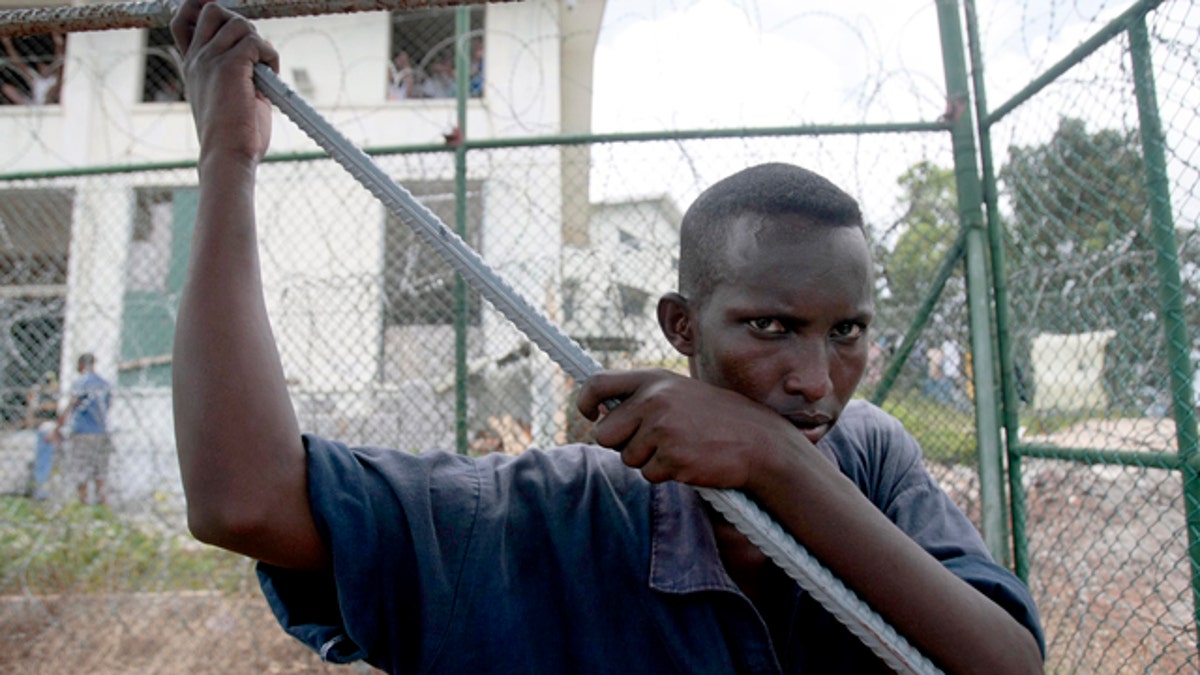
A Somali inmate detained last year during an anti-piracy operation conducted by Seychelles Coast Guard pauses as he works at the incarceration block in Montagne Posee near Victoria, Seychelles. Piracy attacks worldwide reached an all-time high in 2011, becoming more violent and lucrative than ever in the process. (AP)
MONTAGNE POSEE, Seychelles – Like the other 92 Somali pirates held in the Seychelles' hilltop prison, where inmates can glimpse a small, tantalizing slice of this island nation's crystal blue water, Ali Mohammed insists he is innocent.
"No pirates. Fishermen," the tall, wiry 50-year-old insisted.
The tiny island nation of the Seychelles is punching far above its weight in the fight against Somali piracy. Pirates make up 20 percent of the 500-person prison population in the main Montagne Posee Prison. International navies dock on the islands. The U.S. flies aerial surveillance drones from here. And the Seychelles is one of the few countries in the region currently taking pirates to trial.
In a new development, 19 Somali pirates imprisoned in the Seychelles are scheduled to be transferred to the northern Somali region of Somaliland. The breakaway northern enclave of Somaliland has a stable, elected government and the U.N. Office on Drugs and Crime paid $1.5 million to refurbish a prison there so it would meet international standards.
Navies have dropped off pirates for prosecution in Somalia before, said Alan Cole, a lawyer who works with the U.N.'s anti-piracy program. But the transfer would mark the first transfer of convicted prisoners back to Somalia, a necessary step to prevent regional prisons from becoming further overcrowded.
Seychelles President James Michel and Somaliland President Ahmed Mohamed Silanyo said the February agreement is an important step in establishing a sustainable justice program that will see suspected pirates apprehended by naval forces, prosecuted by regional states and imprisoned in Somalia.
"That, in the piracy world, is quite a breakthrough if it happens," said Britain's top diplomat here, Matthew Forbes, who also serves as a liaison in the Seychelles for the EU's anti-piracy naval force.
The transfer would also mark a break from disasters like a botched 2009 prisoner-for-hostages swap. The Seychelles secretly sent a plane with 23 suspected pirates to northern Somalia in return for three of its citizens taken hostage by Somalia. But local authorities had not been informed of the deal, and impounded the plane with security officials onboard.
The international community has been helping Seychelles become a center of the anti-pirate fight. Britain and Seychelles announced last month the creation of a Regional Anti-Piracy Prosecution and Intelligence Coordination Center, an $875,000 U.K.-funded initiative that will gather intelligence to provide evidence for regional and global pirate prosecutions.
"The principle of burden-sharing in the fight against piracy is very important. Seychelles does not have the resources to fight piracy alone; we need the support of the international community both in terms of assets and capacity building," said President Michel.
The Seychelles' newest prison block -- its highest security cells -- was paid for by the U.N. Office and Drugs and Crimes and opened last year. The prison sits high on the Seychelles' main island, surrounded by lush green trees and rolling hills. A small slice of the bright blue Indian Ocean can be seen. Bright, red, tropical birds perch on the top
"A good view, yes, but we want to go home to our family," said Alcide Bouchereau, a Seychelles resident who was sentenced to eight years in prison for possession of 440 grams of cannabis. He has served five years and hopes to be released early next year. He wore a wide smile as he led the group of Somali workers.
The inmates are mostly well-behaved, prison guards said, but all claim to be innocent. One sunny day last week a half dozen of the Somali prisoners used a wheelbarrow to move bricks and dirt for a new retaining wall to help prop up a sagging barbed-wire fence.
"They always say they are fisherman. They are pirates," said Dathna Marie, a prison guard.







































